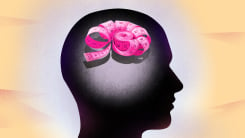These Red Flags Could Mean Your Weight Loss Attempts Are Triggering an Eating Disorder

Drugs like Ozempic have fueled fervor for intentional weight loss in the last year, increasing (if that’s even possible) the societal pressure to try to lose weight. The problem is, weight loss attempts are not always good for you—or harmless.
In fact, trying to lose weight may trigger an eating disorder. According to the National Eating Disorders Association, one study found that females who dieted moderately were five times more likely to develop an eating disorder than those who didn’t diet at all. Extreme diet restriction was associated with an 18-fold increase in risk. About 9% of people in the United States deal with an eating disorder at some point in their lives, and 22% of children and adolescents show disordered eating behavior.
How weight loss can trigger eating disorders
Weight loss is known to be a factor in the onset or relapse of eating disorders. Because attempting to lose weight is so common, it’s important to know the signs of an eating disorder, according to Dr. Elizabeth Wassenaar, regional medical director for Eating Recovery Center. And the risk of dieting leading to an eating disorder is significant.
“About 20-25% of those who attempt to lose weight—or diet—will develop an eating disorder in their lifetime, with 35% of dieters developing rigid, obsessive rituals with food or exercise, without a formal diagnosis,” Wassenaar said.
In a fatphobic society, eating disorder beliefs and behaviors can be hard to distinguish from “healthy” concerns about losing weight.
“Anorexia nervosa restricting type is characterized by an often obsessive fear of weight gain, distorted body image, and refusal to maintain one’s natural body weight. Their focus on weight loss is typically through dieting, fasting, or excessive physical activity,” Wassenaar said. “People in larger bodies may also experience restrictive anorexia and a patient with anorexia may appear ‘healthy’ when they are malnourished.”
A history of losing weight has in itself been shown to be a risk factor for developing eating disorders. In 2020, a study of 1,165 young women with body image concerns showed the relationship between weight suppression and onset of anorexia, bulimia, and purging disorder. The researchers wrote: “The results provide novel evidence that weight suppression correlates with future onset of eating disorders characterized by dietary restriction or compensatory weight control behaviors and suggest weight-suppressed women constitute an important risk group to target with selective prevention programs.”
Eating disorder red flags
According to Wassenaar, these can be red flags that your weight loss attempt is really an eating disorder:
-
Avoiding entire food groups or classifying foods as “good” or “bad.”
-
Having a fear of eating outside the home.
-
Feeling anxiety or shame when you have to break rigid eating patterns.
Other signs of an eating disorder can include:
-
Low weight or sudden weight loss.
-
Feeling cold all the time.
-
Hair thinning or hair loss.
-
Irregular periods.
-
Fear of weight gain.
-
Calorie restriction, strange eating habits, or food rituals.
-
Compulsive exercising.
-
Social withdrawal.
Ozempic may be making the problem worse
Prescriptions for GLP-1 medications like Ozempic and Wegovy increased 300% between the beginning of 2020 and the end of 2022. While this class of drugs has been around and used to treat type 2 diabetes for more than a decade, the surge in popularity is due to the side effect of weight loss that some users experience. (Only about half of people prescribed GLP-1 medications in 2022 had type 2 diabetes.)
“We have already begun to see the impact of GLP-1 agonists as cosmetic weight loss medications on the eating disorder community as more patients are experiencing a relapse to disordered eating after using them,” Wassenaar said.
Aggressive marketing of weight loss drugs, along with the steady marketing of other weight loss diets and remedies, create an environment that people at risk of eating disorders are particularly vulnerable to.
“Eating disorders are complex diseases that thrive in isolation. The idea that you must change your body to achieve health or happiness is an insidious and harmful idea that continues to make billions for drugmakers and diet-infused companies worldwide,” Wassenaar said.
What to do if you suspect an eating disorder
If you recognize any of the red flags or signs mentioned above, check in with a doctor or mental health professional to see if your behaviors around eating are veering into dangerous territory.
“Instead of focusing on weight loss or dieting, focus instead on eating nutritious foods and moving your body in joyful ways,” Wassenaar said. “If you are concerned about developing an eating disorder, be sure to talk with your doctor or mental health professional before starting any weight loss routines. It’s important to understand if you may have, or are at risk of developing, an eating disorder or struggle with disordered eating.”



